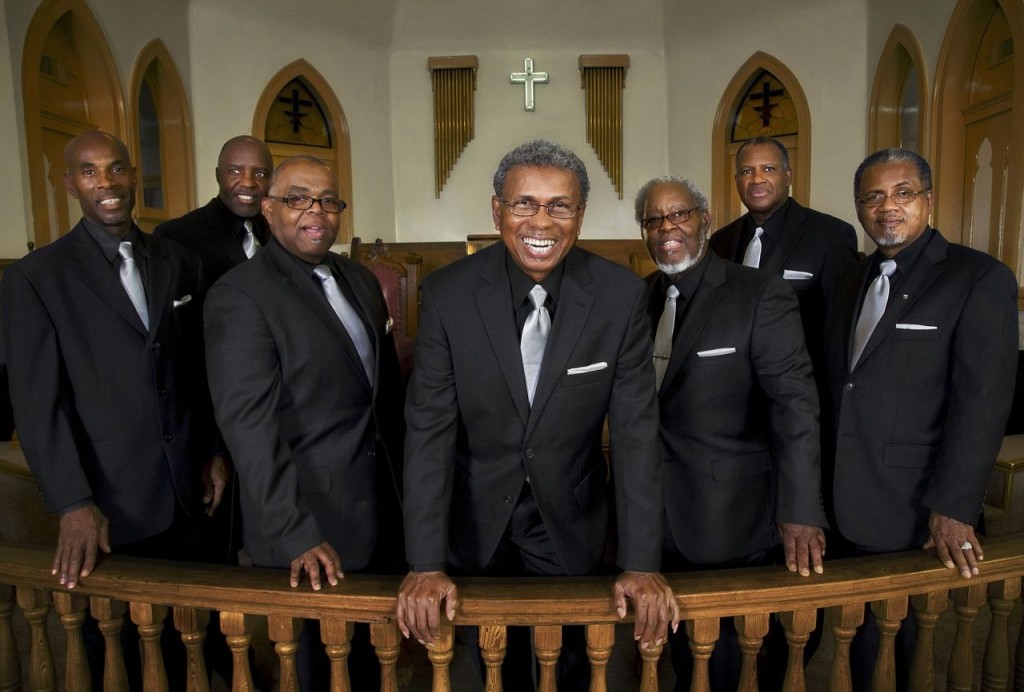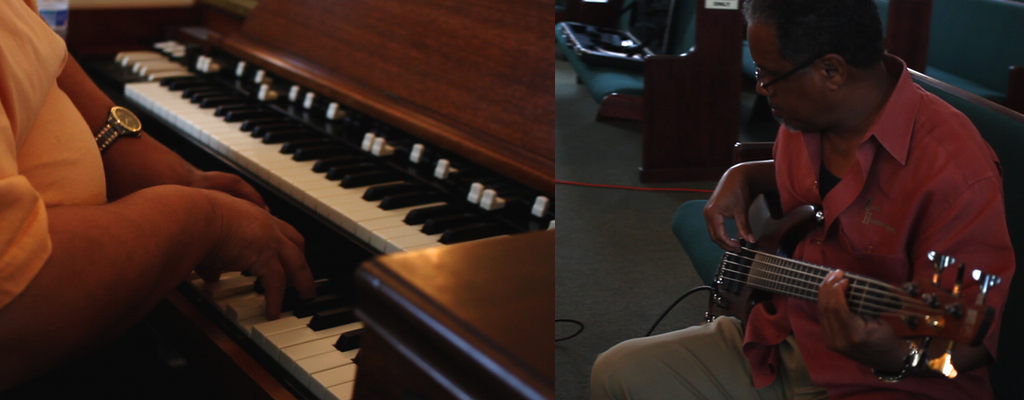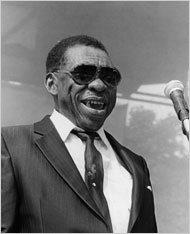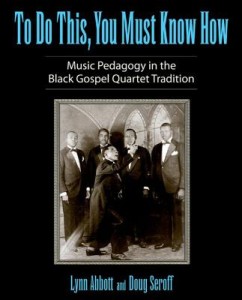
The Zion Harmonizers
THE ELDER STATESMEN OF NEW ORLEANS GOSPEL
The Zion Harmonizers
They are rooted in the quartet singing tradition and a capella harmonies from the turn of the last century. For more than 40 years, The Zion Harmonizers enjoyed an unparalleled platform at the New Orleans Jazz and Heritage Festival, anchoring and curating the Gospel Tent.
In the church of New Orleans jazz, they’ve had the keys to the church of church.
Thank goodness. It’s wonderful.
The Zion Harmonizers began as “New Zion” in 1939. The group’s longtime leader, the “Godfather of the Gospel Tent,” Sherman Washington joined up in 1941 and helped to spread the good news far and wide.
Washington died in 2011. The group is now lead by Brazella Briscoe who has planned a tour to coincide with the release of the Harmonizer’s first new recording in 15 years: Bringing In the Sheaves.
It’s a fitting celebration for a group that’s celebrating a Diamond Jubilee.
Connect with the Harmonizers
Website | Calendar | iTunes | Facebook | Twitter
02 Gospel in Louisiana
03 The Jeter-Simon Bridge
04 The Quartet Tradition
05 Further Reading
06 Playlist
07 Comments
Bringing in the Sheaves

The 2014 album was recorded at Marigny Recording Studio, located in the historic Luthjen’s Dance Hall, which just happens to be where Music Inside Out is produced.
Bringing in the Sheaves was produced by Jason Rhein (American Routes, Music Inside Out) and Brazella Briscoe, and features Brazella’s brother, William Briscoe, Franklin Smith, Marion Chambers, Benjamin Francois and Luther G. Williams on vocals, backed by drummer Joseph Carter, guitarist William Walker, keyboardist Joseph Warrick, and Walter Hardy III on the B3 organ.
An excellent horn section adds New Orleans flavor with arrangements by the great trumpeter Wendell Brunious. He performs along with trumpeter Andre Ride and Christian Winther on tenor saxophone.
The album is available on iTunes and at your local record store. But here’s a little taste: I’ll Rise Again.
I’ll Rise Again

Gospel in Louisiana: Then and Now

The Zion Harmonizers are not, of course, the only Gospel group in Louisiana. The state has a long and storied history of groups that sang — and sing — their hearts out for the greater glory of the Lord.
Some of the great Louisiana quartets of old, now long gone, include:
-
The New Orleans Chosen Four, who became The Soproco Spiritual Singers
The New Orleans Chosen Five
The Gloryland Singers
The Soproco Singers
Robinson’s Humming Four
The Humming Four, featuring Edward Thomas
And there are any number of groups who continue the tradition today, including:
-
The Electrifying Crown Seekers
Voices of Distinction
Leo Jackson and the Melody Clouds
The Bester Singers
Rev. Lois DeJean
Betty Winn & One A-Chord
Shades of Praise
Pastor Jai Reed
Lyle Henderson
Val and Love Alive Community Choir
Tyronne Foster and the Arc Singers
The Rev. Claude Jeter & A Bridge Over Troubled Water

The Rev. Claude Jeter wrote that song. Paul Simon cited Jeter’s lyric, “I’ll be a bridge over deep water if you trust my name,” as the inspiration for the Simon and Garfunkel song, “Bridge Over Troubled Water.”
Jeter, who famously refused to sing secular music, backed up Simon on the album “There’s Goes Rhymin’ Simon” (an album that also featured Allen Toussaint) in the song “Take Me To The Mardi Gras.”
The Quartet Tradition in Early Jazz

Most of the first great jazz performers sang with secular or religious quartets, including Buddy Bolden, Jelly Roll Morton and Louis Armstrong. Morton and Armstrong both went on record about their experiences.
In his memoir, Satchmo, Armstrong writes:
First, I must explain how our quartet used to do its hustling so as to attract an audience. We began by walking down Rampart Street between Perdido and Gravier. The lead singer and the tenor walked together in front followed by the baritone and the bass. Singing at random we wandered through the streets until someone called to us to sing a few songs. Afterwards we would pass our hats and at the end of the night we would divvy up. Most of the time we would draw down a nice little taste. Then I would make a beeline for home and dump my share into mama’s lap.
Little Mack, our lead singer, later became one of the best drummers in New Orleans. Big Nose Sidney was the bass. Redhead Happy Bolton was the baritone. Happy was also a drummer and the greatest showman of them all, as all the old-timers will tell you. As for me, I was the tenor. I used to put my hand behind my ear, and move my mouth from side to side and some beautiful notes would appear. Being young, I had a high voice and it stayed that way until I got out of the orphanage into which I was about to be thrown….
—Louis Armstrong, Satchmo: My Life in New Orleans
Jelly Roll Morton described his time singing in a quartet (and enjoying sandwiches) to the legendary folklorist and ethnomusicologist Alan Lomax. Those interviews took place in 1938.
Morton-Lomax excerpt
The Morton-Lomax interviews have been released by Rounder Records as Jelly Roll Morton: The Complete Library of Congress Recordings.
FURTHER READING
To Do This, You Must Know How

If you’re interested in learning more about the music, we can recommend a terrific new book by Lynn Abbott and Doug Seroff titled To Do This, You Must Know How: Music Pedagogy in the Black Gospel Quartet Tradition.
Abbott curates recorded sound at the Hogan Jazz Archive at Tulane, the leading research center for the study of New Orleans jazz and related musical genres, including New Orleans ragtime, gospel, blues, rhythm and blues, and Creole songs. Seroff is an independent scholar.
It’s published by the University Press of Mississippi. Track it down at your library or local bookstore.
Among the early spiritual and gospel quartet veterans we interviewed, there was a shared notion of having taken part in something of value and significance — and sometimes a sense of relief that someone had finally shown up to acknowledge it. One old singer offered this greeting: “I knew you were coming. I didn’t know who you would be, but I knew you were coming.”
—from the front matter of the book
Playlist
Each week we provide a complete playlist of the music heard on the broadcast. Our hope is that you’ll print it out and take it with you the next time you visit your local record store. Thanks for supporting the musicians and your local music retailer.
Right-click to save playlist (.pdf)
![]()
